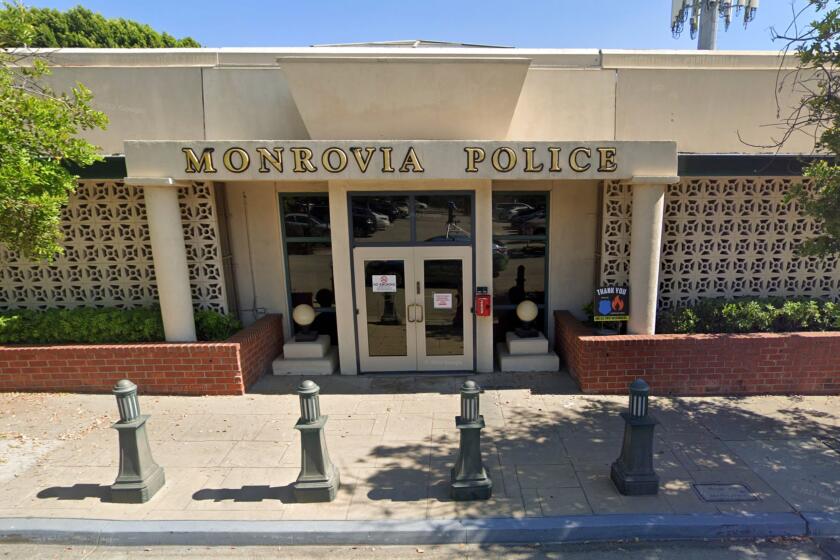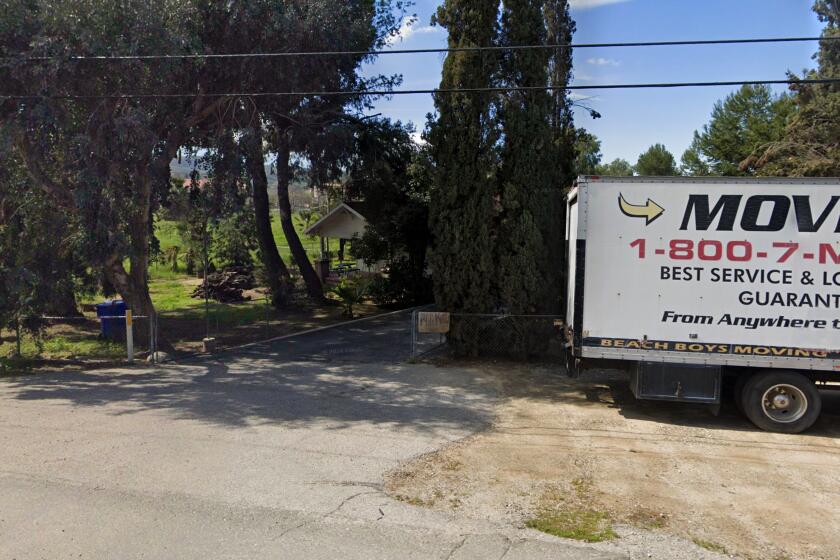Orange County Initiative : Judge Rejects Suit to Keep Growth Issue Off Ballot
An Orange County Superior Court judge Tuesday rejected efforts to keep a controversial slow-growth initiative off the countywide ballot in the June 7 primary election.
Top officials of the Building Industry Assn. of Southern California, a Los Angeles-based trade association that is one of the plaintiffs in the lawsuit challenging the initiative, said they probably would appeal.
The BIA and the other two plaintiffs--the Orange County Chamber of Commerce and the Commercial Industrial Development Assn.--argued that the initiative is an unconstitutional interference with property rights and that it would shut down construction in the county.
In his six-page ruling, Judge John C. Woolley wrote that he found the home builders’ arguments “less than persuasive” enough to justify removing the initiative from the ballot.
“It is usually more appropriate to review constitutional and other challenges to initiative measures after the election rather than disrupt the electoral process by preventing the exercise of the people’s franchise,” Woolley wrote.
A lawyer for the citizens group sponsoring the initiative said the judge’s ruling was “very clear.”
“For that reason, it’s going to be hard for the Court of Appeals to overturn it,” said Belinda Blacketer, a Laguna Beach lawyer and one of the authors of the measure. “And the building industry now has a very short time line for an appeal.”
Tom Rogers, a co-founder of the group that launched the initiative effort, said filing the lawsuit in the first place was a fatal mistake for builders who want to defeat the measure because it shows voters that developers are trying to avoid an election.
“They tried to subvert the process by using the courts, and they failed,” Rogers said. “They can’t come back to the process that they tried to subvert and ask for support from the voters.
“I think their campaign has just collapsed; they rolled the dice and lost. By trying to usurp the citizens’ right to vote on such an important topic, the BIA has proved that they are a disgrace to the community; they are a disgrace to the industry they claim to represent and they are a disgrace to the political process.”
The initiative would require developers to improve roads and meet standards for park space and flood control before they could build in unincorporated areas of the county.
Its supporters say county officials have long ignored their own guidelines in approving construction projects without considering their impact on traffic and public services.
Opponents of the measure say it sets standards so high they would choke off all construction and send the county’s economy into a tailspin.
“The impact on the economy could be devastating,” Gordon Tippell, an Orange County home builder and president of the BIA’s Orange County chapter, said after Tuesday’s ruling. “I’m very disappointed.”
The time available for an appeal that might literally keep the initiative off the June ballot is short. The county’s registrar of voters said after the ruling that he would send material describing the Citizens Sensible Growth and Traffic Control Initiative to the printer Friday for inclusion on the sample ballot.
Sample ballots mailed to voters could be printed as soon as mid-April, according to the registrar’s office.
“We’re going to need to make a decision very promptly,” said Don Steffensen, president of the Building Assn. of Southern California. “I’d be supportive of an appeal.”
Steffensen and Tippell are among a small group of executives who will decide whether to appeal after consulting with lawyers.
Tippell said an appeal is “most likely,” as did a third executive, Encino developer Mel Wynn, first vice president of the Building Industry Assn. of Southern California.
County supervisors, who were forced to put the initiative on the ballot after supporters gathered nearly 96,000 petition signatures, have taken a neutral stance in the lawsuit, even though they are named as defendants. All five supervisors have criticized the initiative.
Supervisors said Tuesday that they were not surprised by the judge’s ruling and not opposed to it.
“The public exercised its legal opportunity to make a decision, and I didn’t see how any other course of action would have been acceptable,” Supervisor Thomas F. Riley said.
California courts have been reluctant to remove an initiative from the ballot before a vote, though they have done so on occasion in the past few years.
The legal standard that must be met before an initiative can be removed from the ballot is very stringent: It must be proved to be clearly unconstitutional or unlawful.
In his written opinion, Woolley said there was not enough evidence to conclude that the Orange County slow-growth initiative was either.
“This court concludes that notwithstanding the existence of some unresolved uncertainties, as to which judgment is reserved, the initiative under scrutiny survives the pre-election challenge,” Woolley wrote.
The lawsuit challenging the initiative--which is favored by an estimated 73% of the county’s registered voters, according to a February poll commissioned by The Times--was filed March 3.
If the initiative passes, developers are likely to continue this and other legal challenges after the election in June, when they may be able to produce more evidence that the initiative is unconstitutional or unfairly cuts off construction.
One opponent of the initiative said he believed that the judge’s decision Tuesday will rouse people “who have been a little dormant until now.”
“It’s hard to get people to raise money when they think they might still beat this thing cheaply in the courts,” said John Simon, a Newport Beach lawyer and chairman of an anti-initiative group known as Citizens for Traffic Solutions.
The group this week mailed 2,000 fund-raising letters to Orange County residents with a goal of raising $1 million for a campaign against the measure.
A big problem, Simon acknowledged, may develop if the group--which is trying to distance itself from the real estate industry--decides to try to raise that much money without the help of the county’s biggest developers.
The Building Industry Assn., which is financing the lawsuit challenging the initiative, says it is not planning on raising money for a political campaign against the measure.
Times staff writer Dave Lesher contributed to this story.
WHAT THE SLOW-GROWTH MEASURE WOULD DO The proposed countywide slow-growth measure, the Citizens Sensible Growth and Traffic Control Initiative, would:
Require that new roads generally be sufficient to accommodate traffic moving at certain average speeds during commute hours.
Require that the average traffic delay at new intersections generally not exceed 40 seconds, depending on the availability of left-turn pockets and other design configurations.
Require that congestion generated by new development on existing roads or intersections be offset by traffic improvements paid for by developers within three years of construction.
Set a minimum response time of five minutes for police, fire and paramedics in emergencies, 10 minutes in non-emergencies.
Require more parkland dedication by developers.
Set a minimum flood control standard requiring that new developments be able to withstand the heaviest kind of heavy flooding, which occurs on an average of once every 100 years.
More to Read
Start your day right
Sign up for Essential California for news, features and recommendations from the L.A. Times and beyond in your inbox six days a week.
You may occasionally receive promotional content from the Los Angeles Times.






